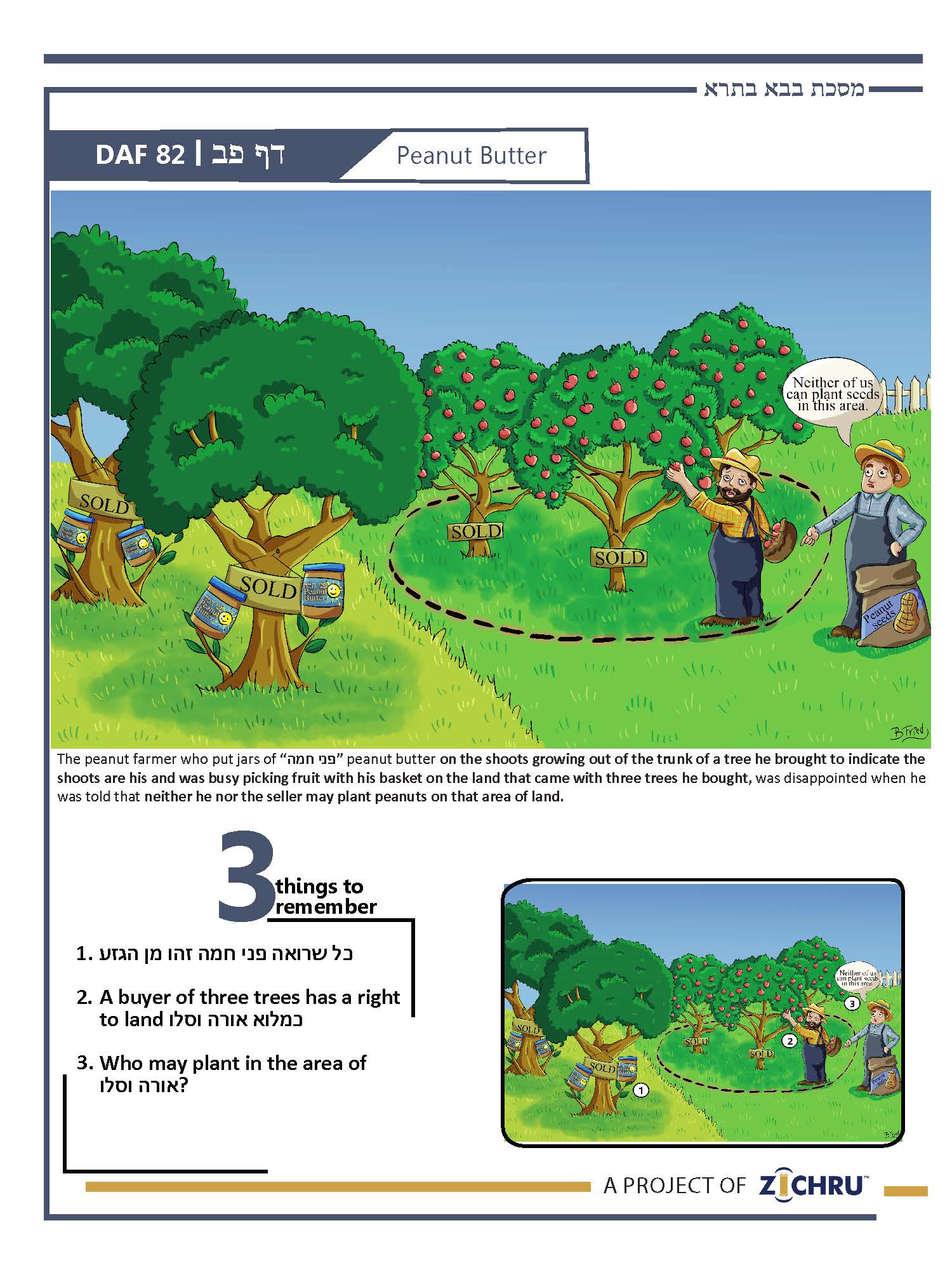Bava Basra - Daf 82
- Audio Timestamps
0:00 - The 3 Sugyos
3:14 - Review of 3 Sugyos
6:11- Siman
8:43 - 4 Blatt Back Chazarah
15:39 - Pop Quiz (Last 7 blatt)
For access to all Zichru resources including PDFs, and illustrations CLICK HERE
- מן הגזע means כל שרואה פני חמה
The Mishnah on Daf 81a taught (where someone bought trees but not land) that whatever grows from the גזע – trunk belongs to the buyer, and whatever grows from the שרשין – roots belongs to the seller. Rebbe Yochanan defines these terms: כל שרואה פני חמה – anything that sees the face of the sun, i.e., that begins growing above ground, זהו מן הגזע – this is categorized as from the trunk, ושאינו רואה פני חמה – and anything that does not see the face of the sun, i.e., it begins growing from underground, זהו מן השרשין – this is categorized as from the roots. The Gemara asks that if the buyer keeps shoots growing out from the base of the trunk, we should be concerned דלמא מסקא ארעא שירטון – perhaps soil will build up between them, giving the shoot an appearance of a separate tree. The buyer can then claim, “You sold me three trees, and I have right to land!” Rav Nachman says: יקוץ – [the buyer] must cut down any shoots which grow from the trunk; the Mishnah means only that the wood belongs to the buyer.
- A buyer of three trees has a right to land כמלוא אורה וסלו
The Mishnah taught that one who buys three trees acquires land. Rebbe Yochanan explained how much land is acquired: תחתיהן וביניהן – under [the trees] and between them, וחוצה להן כמלוא אורה וסלו – and land outside [the trees] large enough for one picking fruit and his basket beside him. Rebbe Elazar asked: השתא דרך אין לו – Now, if he does not even have a path through the seller’s field, but must purchase a right-of-way to access his trees, אורה וסלו יש לו – can he have space for a picker and his basket, which is less necessary?! The buyer has not acquired a path through the seller’s field, דארעא אחריתי היא – because the land where the trees are growing is another person’s land, he certainly should not have a right to כמלוא אורה וסלו in the seller’s field, for the same reason!? Rebbe Zeira infers from Rebbe Elazar’s words that where someone buys two trees, and does not acquire land, he would have a right to a path, because he can tell the seller: בארעא דידך קיימי – “[My purchased trees] are standing in your land, and it was understood that I should have access to them.” Rava explains that Rebbe Elazar’s entire question was based on the premise that our Mishnah holds מוכר בעין רעה מוכר, but this is ultimately deflected.
- Who may plant in the area of אורה וסלו?
Abaye asked Rav Yosef: אותן אורה וסלו מי זורען – Who may plant the area around the purchased trees for the picker to stand with his basket? Does the buyer acquire this land fully, and may plant there, or is it essentially the seller’s land, and the buyer merely has the right to use it for harvesting his trees? Rav Yosef quoted a Mishnah, where the owner of an inner garden has a right to a דרך through an outer garden, which states: החיצון זורע את הדרך – the owner of the outer garden may plant the path. Here, too, the seller may plant the area of אורה וסלו, despite the buyer’s right to use it. Abaye objected to the comparison, because whereas the inner owner’s access is not impeded by the planting of the דרך, in our case, אית ליה פסידא ללוקח – there is a loss to the buyer if the seller plants in the "אורה וסלו" area, because the buyer can say: קמיטנפי פירי – “My fruits are soiled by your seeds when they fall on them!”
Abaye quoted the סיפא of that Mishnah, that if both parties agreed to a specific path on the side, זה וזה אינן רשאין לזורעה – neither [party] may plant in it. Here, too, neither may plant in the אורה וסלו. A Baraisa supports Abaye’s position.


